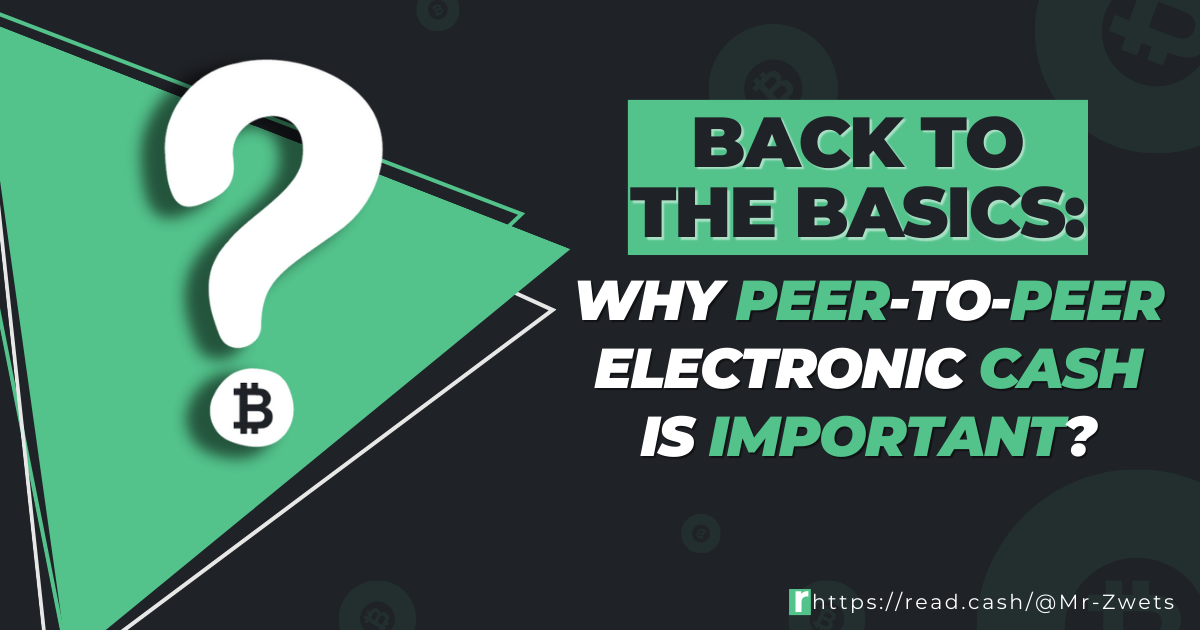Back to the basics: Why peer-to-peer electronic cash is important

With this upcoming second Bitcoin Cash split presenting another obstacle and taking a major toll on community sentiment it's helpful to keep the goal in mind.
A solution to what problems?
Most will be able to say the key innovation of bitcoin is to get rid of the trusted third party, or in other words that is it trustless or decentralized but this just begs the question. As a start to answering the question we'll turn to the whitepaper.

Why are these financial institutions a problem?

This argument is easy enough to follow, cutting out middlemen would lead to lower transaction costs which in turn would lead to lower minimum practical transaction [amounts].

Again Satoshi stresses the extra costs caused by reversible transactions namely the cost of hassling information and the cost of fraud. Both of these could be seen as transaction costs in the broad sense. It is interesting then that the whole point of not having according to the whitepaper is having lower fees, especially given the nature of the scaling debate.
Skepticism
If the only benefits of the system were the ones Satoshi listed in the whitepaper there would be little reason for enthusiasm as lower transaction costs by themselves are not enough to overcome the network effect of money. Everyone want to accept the same money everyone else is and the volatility drawback decreases with more liquidity. We may even doubt that the initial reason that transactions for small casual amounts would be cut off due to mediation costs is still true in the first world. Then there's also the cost of switching infrastructure which is not trivial and the cost of learning enough about the new currency and how it works.
Non-reversible payments
As Bitcoin's history has shown the fact that Bitcoin transactions cannot be censored is of great advantage not just because it decreases transaction costs in the broad sense but mainly it allows for dissidents such as journalists, political extremists, grey market participants and criminals to use an online currency when they are being censored by the financial intermediaries. The two examples which instantly come to mind are Wikileaks and the Silk Road. Wikileaks is a media organization created by Jullian Assange which publishes classified media and is best known for exposing war crimes and which starting to accept Bitcoin in 2010. The Silk Road is an online marketplace accepting Bitcoin that launched on which two willing parties could trade anything provided it wouldn't hurt anybody else, most of the site's transactions was the buying and selling of marijuana . The site was shut down in 2013 and Ross Ulbricht who was sentenced to life long in jail. Jullian Assange is also arrested and being prosecuted by governments. The two examples are powerful because they show the ideal beneficiaries of uncensorable money: a journalist exposing war crimes and a young entrepreneur fighting the war on drug. While the second example is certainly more morally ambiguous in part because there is a lot of wrong information about the case online, it is at least as important because it shows how Bitcoin can be used to circumvent immoral laws. Ross Ulbricht was certainly a criminal in the legal sense but as the libertarian saying goes: good man disobeys unjust laws. Bitcoin enables civil dissidence and hence is a tool for freedom. Making a utilitarian case that the amount of good that follows by enabling everyone to transact (vastly) outweighs the good is not necessarily an easy case. Three broad approaches have been taken. The first one is an examination of how effective the intermediaries are at actually catching illegal transactions by the means of anti-money laundering practices, KYC and other financial surveillance are "worse than useless", a phrase coined by the prominent Bitcoin Advocate Andreas Antonopoulos, meaning that they are a net negative and don't do anything to improve the situation. Contrasting the pragmatic empirical approach is the broad sweeping idea that all new technology enables humans to use it both good and bad ways and that this doesn't make the technology itself either good or bad, the technology just is and can not be uninvited. This is often combined with sidestepping the issue by asserting that on aggregate humans will always primarily use new technology for good. A third approach is to use a natural rights approach to invalidate utilitarian reasoning: every human has a god-given/natural right to use money. This approach is not compatible with libertarianism as this is a positive right: the right that an financial intermediary associate with you. Of course this is directly contrary to the principle of free association. Bitcoin solves this problem by enabling everyone equally to transact without venturing into positive rights.
Another important reason why financial intermediaries censor is that a transaction crosses borders and not all these international transactions are allowed by governments. Bitcoin circumvents these arbitrary restrictions, it is a true global currency which does not notice borders.
Implicitly they also censor by not allowing people to use money because they don't have a government issued ID or don't meet other arbitrary requirements. Because Bitcoin removes the middleman it does away with barriers to entry of the legacy financial system. Although Bitcoin thusfar has had limited succes in reaching the third world and helping the unbanked, the potential is certainly there because it greatly improves accessibility of digital transactions.
Trustless
Trustless is a broader concept than uncensorable which includes it. Apart from not trusting the intermediary anymore to transact, you also do not need to trust anything about the money itself: you can check the total supply (of base money) and know the emission scheduled (of the base money) in advance. This important advantage is simply not mentioned in the founding document.
It is important to specify this is relating to base money because it would be possible to imagine a fractional reserve banking scheme also gets introduced with bitcoin which would introduce the conventional separations of MB, M1, M2, M3 etc from conventional economics.
The Bitcoin emission algorithm simply halves the inflation rate of the money supply (in terms of new bitcoins, not percentual) every four years there is a finite supply of 21 million coins which will ever be created. In traditional economics jargon a currency is deflationary if it loses purchasing power according to an arbitrary constructed price index, this is also called price deflation. Bitcoin is price deflationary overall because over time the amount of goods the same amount of Bitcoin could buy tended to decrease. The other use of inflation and deflation relates to the change in base money. Using this terminology Bitcoin has an inflationary money supply meaning the base money grows each consecutive year. Towards the end of the exponential decay function of the emission schedule the supply of Bitcoin might actually decrease in the end due to lost coins etc which do not get replaced in which case Bitcoin has a deflationary money supply.
Bitcoin could have released with any algorithm governing supply such as an indefinite 2% inflation rate of the money supply with which it would conform to the recommendations of the famous monetary economist Milton Friedman. Broadly speaking macro economics has three different schools of thought: the Keynesians, the monetarists (of which Milton Friedman is one) and the Austrians. Because of it's finite supply and price deflation it appeals only to the Austrian school, which falls mostly out of the Overton window in academia. Both Keynesians and monetarists regard price deflation as just as dangerous as price inflation and hence are often very skeptical of Bitcoin. This is not a fundamental critique since the algorithm could be tweaked to appeal to different schools, with the monetarists already being mentioned since the policy prescription was very straightforward. With the use of introspection of the content of the blockchain more advanced algorithms could be constructed for example taking into account the money velocity, or the amount locked in time contracts. Although this is venturing outside the scope of trustlessness, if one is most concerned about the macro economic viability, the system could be iterated upon to include data from outside oracles and incorporate many variables this way into a complex algorithm.
Privacy

let's look at this critically, do financial intermediaries limit access to info only to the parties involved or do they also share it with the government or sell your data to advertisers? Additionally the part "Some linking is still unavoidable with multi-input transactions, which necessarily reveal that their inputs were owned by the same owner." has been proven false as partial signatures allow for coinjoin transaction or cashfusion transactions where multiple inputs are not necessarily from the same owner. With these innovations it can be argued that bitcoin has a superior privacy model to that of financial intermediaries. The question whether more financial privacy is good for society on the aggregate is the same as for uncensorability.
Given these selling points advocates can easily be led to exaggerate financial surveillance, costs in the legacy system, the uncertainty of the dollar's status and financial censorship. The selection effect however is probably way more important, the people who tend to become big advocates of bitcoin tend to be the ones more concerned with these issues to begin with.



